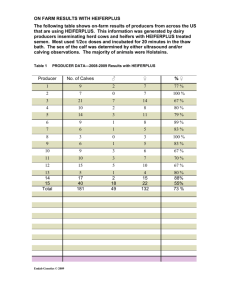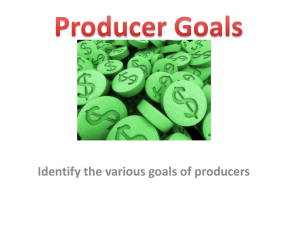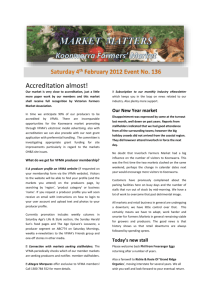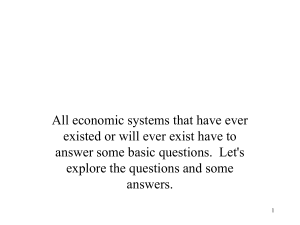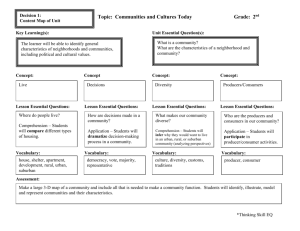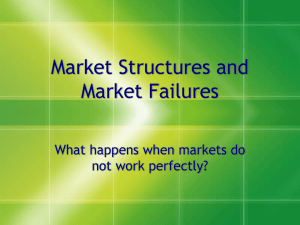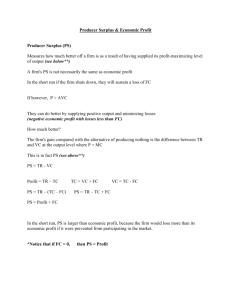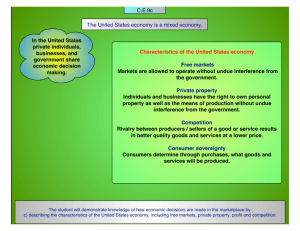why “trader sovereignty” makes more sense than consumer
advertisement
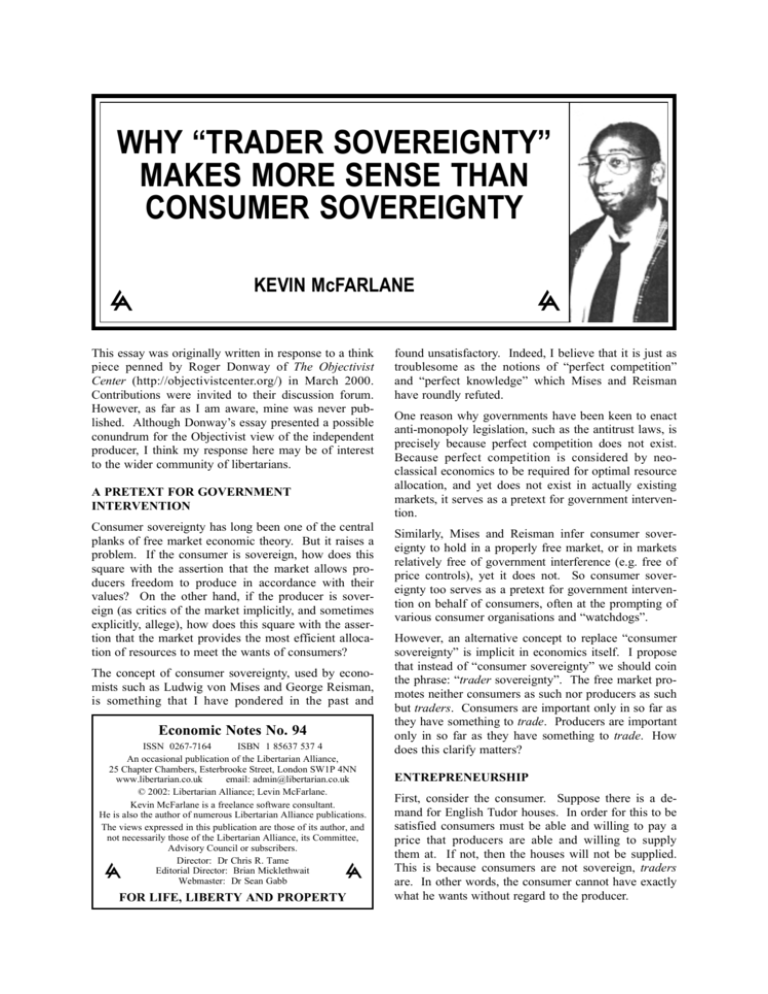
WHY “TRADER SOVEREIGNTY” MAKES MORE SENSE THAN CONSUMER SOVEREIGNTY KEVIN McFARLANE This essay was originally written in response to a think piece penned by Roger Donway of The Objectivist Center (http://objectivistcenter.org/) in March 2000. Contributions were invited to their discussion forum. However, as far as I am aware, mine was never published. Although Donway’s essay presented a possible conundrum for the Objectivist view of the independent producer, I think my response here may be of interest to the wider community of libertarians. A PRETEXT FOR GOVERNMENT INTERVENTION Consumer sovereignty has long been one of the central planks of free market economic theory. But it raises a problem. If the consumer is sovereign, how does this square with the assertion that the market allows producers freedom to produce in accordance with their values? On the other hand, if the producer is sovereign (as critics of the market implicitly, and sometimes explicitly, allege), how does this square with the assertion that the market provides the most efficient allocation of resources to meet the wants of consumers? The concept of consumer sovereignty, used by economists such as Ludwig von Mises and George Reisman, is something that I have pondered in the past and Economic Notes No. 94 ISSN 0267-7164 ISBN 1 85637 537 4 An occasional publication of the Libertarian Alliance, 25 Chapter Chambers, Esterbrooke Street, London SW1P 4NN www.libertarian.co.uk email: admin@libertarian.co.uk © 2002: Libertarian Alliance; Levin McFarlane. Kevin McFarlane is a freelance software consultant. He is also the author of numerous Libertarian Alliance publications. The views expressed in this publication are those of its author, and not necessarily those of the Libertarian Alliance, its Committee, Advisory Council or subscribers. Director: Dr Chris R. Tame Editorial Director: Brian Micklethwait Webmaster: Dr Sean Gabb FOR LIFE, LIBERTY AND PROPERTY found unsatisfactory. Indeed, I believe that it is just as troublesome as the notions of “perfect competition” and “perfect knowledge” which Mises and Reisman have roundly refuted. One reason why governments have been keen to enact anti-monopoly legislation, such as the antitrust laws, is precisely because perfect competition does not exist. Because perfect competition is considered by neoclassical economics to be required for optimal resource allocation, and yet does not exist in actually existing markets, it serves as a pretext for government intervention. Similarly, Mises and Reisman infer consumer sovereignty to hold in a properly free market, or in markets relatively free of government interference (e.g. free of price controls), yet it does not. So consumer sovereignty too serves as a pretext for government intervention on behalf of consumers, often at the prompting of various consumer organisations and “watchdogs”. However, an alternative concept to replace “consumer sovereignty” is implicit in economics itself. I propose that instead of “consumer sovereignty” we should coin the phrase: “trader sovereignty”. The free market promotes neither consumers as such nor producers as such but traders. Consumers are important only in so far as they have something to trade. Producers are important only in so far as they have something to trade. How does this clarify matters? ENTREPRENEURSHIP First, consider the consumer. Suppose there is a demand for English Tudor houses. In order for this to be satisfied consumers must be able and willing to pay a price that producers are able and willing to supply them at. If not, then the houses will not be supplied. This is because consumers are not sovereign, traders are. In other words, the consumer cannot have exactly what he wants without regard to the producer. There are two ways in which producers can fail to satisfy consumer demand: 1. The price that consumers are able and willing to pay is less than the price producers are able to supply them at, or 2. Producers are able to supply them at this price but are unwilling. However, 2 gives rise, potentially, to a different set of forces. The lack of a supply of English Tudor houses would mean that there is an unsatisfied demand. But this is not unusual and, in fact, is expected in the market. It is what gives rise to entrepreneurship. Entrepreneurs are those who discover discrepancies between the wants of consumers and current allocations of factors of production. We might find that some of the consumers, who want English Tudor houses, finding that none are being supplied, decide to become entrepreneurs themselves. Many new businesses start in this way – due to consumers discovering that no products are available that meet their requirements. The market is a dynamic system and its driving force is disequilibrium. It is never in equilibrium but rather exhibits tendencies towards equilibrium – which tendencies are constantly being upset by the emergence of new data caused by the ever-changing wants of consumers. PRODUCTION INVOLVES TRIAL AND ERROR There is, however, another sense in which consumer sovereignty does not hold. This is that producers often suggest or guess products that consumers might want and hope that they do, in fact, want them. Indeed, to some extent, all production is speculation against an unknown future. There is never any guarantee that products in demand today will continue to be in demand tomorrow. One reason why entrepreneurs suggest or guess what consumers want is that often consumers cannot articulate what they want until some product appears before them. In other words, production involves trial and error. A producer offers something, for example, a new word processor with certain features. Consumers then comment on what they like and what they don’t like. Also, some features that were dreamt up by the producer, independently of the consumer, often stimulate the consumer into suggesting alternatives or improvements. Had those features not been offered in the first place, the consumer might not have suggested them. Now consider the producer. The independent producer, while free not to supply English Tudor houses, is not free qua architect to do just as he pleases, while continuing to make a living as an architect. This is because producers are not sovereign, traders are. In other words, the producer cannot have exactly what he wants without regard to the consumer. If no consumer is willing to purchase the type of home that the producer is willing to supply then he must wait for future consumers to seek him out. If this does not happen then he either has to persuade people to accept his values or he must seek remuneration in another profession, where there is a better prospect of a match between what consumers want and what he is willing to supply. However, in most markets we don’t often get the extreme situation where many consumers want products such as English Tudor houses but no producers are willing to supply them (assuming an economic price). This is because tastes are diverse. Some architects will be perfectly willing to supply English Tudor houses and will either not consider them to be an affront to their values or else will be indifferent to them. So, in the aggregate, there does tend to be a movement toward optimal allocation of resources. CHANGES IN DEMAND Also, because abilities and aptitudes are evenly distributed it is generally the case that the market will respond to changes in consumer demand. First, it is the case that producers can be found to satisfy most preferences. Second, producers in a given profession usually have an aptitude not solely for that profession. Thus if one enjoys physics and mathematics then it is likely that an individual, currently employed as an electronics engineer, may be willing to change not only to another branch of engineering but also to professions that employ people with similar types of mental skill, for example, computer programming. Thus an increase in demand for the services of computer programmers is capable of being met by entrants from the field of engineering, say, without their necessarily having to compromise their values. (Many engineering graduates do, in fact, choose computer programming as a profession.) On the other hand, general diversity means that, should an individual never want to work as a computer programmer, he need not. There usually is an outlet for an independent producer. THE TRADER IS THE DRIVER OF WHAT GETS PRODUCED Finally, despite the foregoing criticisms, there is a sense in which consumer sovereignty does hold. This is the sense in which the consumer functions as the ultimate judge of the producer’s products. The consumer provides positive and negative feedback. By choosing to purchase or not purchase the producer’s products he determines whether the producer flourishes or goes out of business. But the consumer as such is not the driver of what gets produced. The trader is. The trader means the “consumer in relation to the producer”, where both parties are able and willing to make the trade.
